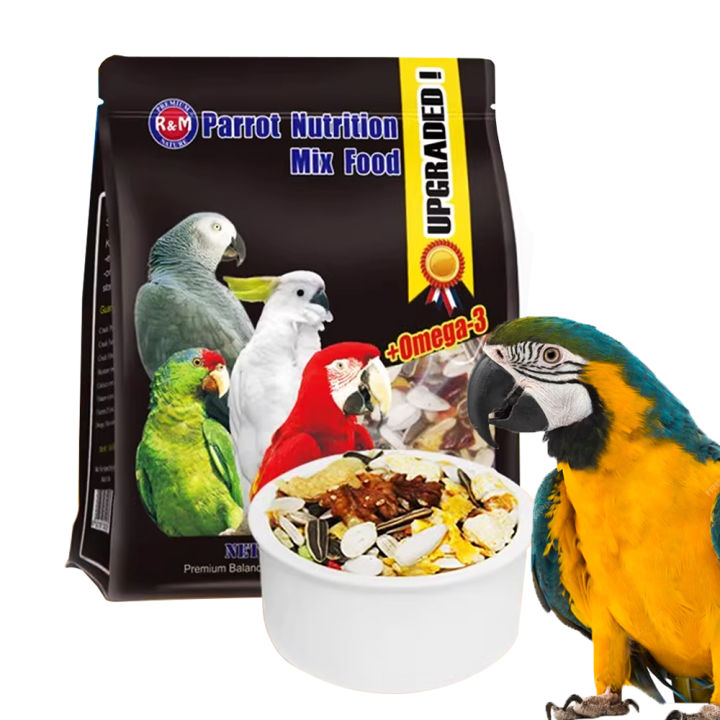
Balanced Parrot Food with Omega-3
Parrots are intelligent and social creatures that make wonderful companions. To ensure their health and well-being, it is essential to provide them with a balanced diet that meets their specific nutritional needs. One crucial aspect of a parrot’s diet is the inclusion of omega-3 fatty acids, which play a vital role in their overall health. This article will explore the importance of balanced parrot food with omega-3 and how to incorporate it into your feathered friend’s diet.
The Importance of Balanced Parrot Food
A balanced diet is the foundation of a healthy parrot. Wild parrots consume a diverse range of foods, including fruits, vegetables, seeds, nuts, and insects, which provide them with a wide array of nutrients. However, pet parrots often rely on commercially available parrot food, which may not always meet their nutritional requirements.
A balanced parrot food should consist of the following components:
- Pellets: High-quality pellets should form the basis of a parrot’s diet, providing them with essential vitamins, minerals, and amino acids.
- Fresh fruits and vegetables: Offer a variety of fresh fruits and vegetables daily, such as leafy greens, carrots, bell peppers, berries, and melons.
- Seeds and nuts: Provide seeds and nuts in moderation, as they are high in fat. Choose a mix of different seeds and nuts, such as sunflower seeds, pumpkin seeds, almonds, and walnuts.
- Legumes: Offer cooked or sprouted legumes, such as beans, lentils, and peas, as they are a good source of protein and fiber.
- Grains: Provide cooked grains, such as brown rice, quinoa, and oats, as they are a good source of carbohydrates and fiber.
The Role of Omega-3 Fatty Acids
Omega-3 fatty acids are essential fats that play a crucial role in various bodily functions. They are particularly important for parrots due to their numerous health benefits.
Brain Health
Omega-3 fatty acids are essential for brain health and cognitive function. They support the development and maintenance of brain cells, improving memory, learning, and overall cognitive performance. Parrots are intelligent creatures, and adequate omega-3 intake can help them stay mentally sharp and engaged.
Heart Health
Omega-3 fatty acids have been shown to reduce the risk of heart disease in humans, and they can also benefit parrots’ cardiovascular health. They help lower triglyceride levels, reduce inflammation, and improve blood flow, promoting a healthy heart.
Joint Health
Omega-3 fatty acids have anti-inflammatory properties that can help reduce joint pain and stiffness. This is particularly beneficial for older parrots or those with arthritis, as it can improve their mobility and quality of life.
Feather Health
Omega-3 fatty acids contribute to healthy feather growth and maintenance. They help keep feathers shiny, strong, and resistant to breakage. Adequate omega-3 intake can also help prevent feather plucking, a common behavioral problem in parrots that can be caused by nutritional deficiencies.
Immune System Support
Omega-3 fatty acids play a role in supporting the immune system. They help regulate immune cell function, making parrots more resistant to infections and diseases.
Sources of Omega-3 Fatty Acids for Parrots
There are several ways to incorporate omega-3 fatty acids into your parrot’s diet:
Flaxseeds
Flaxseeds are an excellent source of omega-3 fatty acids. They can be added to your parrot’s food whole or ground. However, it is important to note that flaxseeds should be ground or crushed before feeding to parrots, as they may not be able to digest them whole.
Chia Seeds
Chia seeds are another good source of omega-3 fatty acids. They can be added to your parrot’s food whole or ground. Chia seeds are also a good source of fiber and antioxidants.
Hemp Seeds
Hemp seeds are a complete protein source and contain omega-3 and omega-6 fatty acids in a balanced ratio. They can be added to your parrot’s food whole or ground.
Walnuts
Walnuts are a good source of omega-3 fatty acids, as well as other essential nutrients. They can be offered as a treat or added to your parrot’s food in moderation.
Fatty Fish
Fatty fish, such as salmon, tuna, and sardines, are excellent sources of omega-3 fatty acids. However, it is important to note that fish should be cooked thoroughly before feeding to parrots, as raw fish can contain harmful bacteria.
Omega-3 Supplements
If you are concerned that your parrot is not getting enough omega-3 fatty acids from their diet, you can consider adding an omega-3 supplement to their food. However, it is important to consult with your veterinarian before giving your parrot any supplements, as some supplements can be harmful if given in excess.
How to Incorporate Omega-3 into Your Parrot’s Diet
Here are some tips on how to incorporate omega-3 fatty acids into your parrot’s diet:
- Add flaxseeds, chia seeds, or hemp seeds to your parrot’s food daily. Start with a small amount and gradually increase the amount as your parrot gets used to it.
- Offer walnuts as a treat or add them to your parrot’s food in moderation.
- Feed your parrot cooked fatty fish once or twice a week.
- Consult with your veterinarian about adding an omega-3 supplement to your parrot’s diet.
Conclusion
A balanced diet is essential for the health and well-being of parrots. Omega-3 fatty acids are a crucial component of a balanced parrot diet, providing numerous health benefits, including improved brain health, heart health, joint health, feather health, and immune system support. By incorporating omega-3-rich foods into your parrot’s diet, you can help them live a long, healthy, and happy life.

